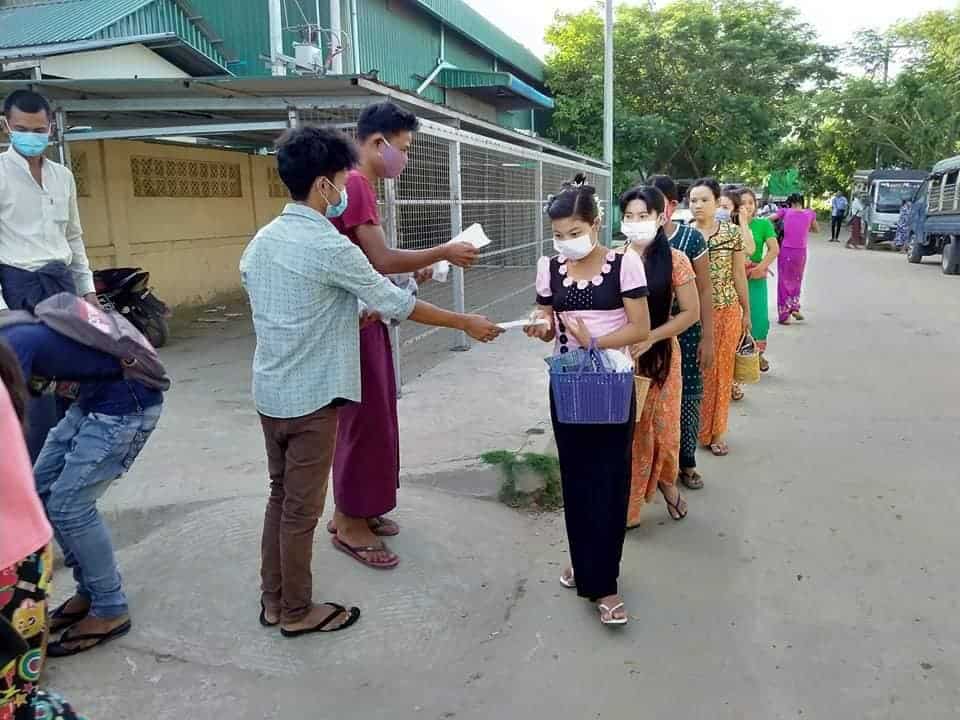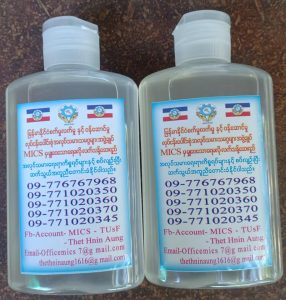Organising in the time of COVID-19: Update from Myanmar
Despite a relatively low number of cases, the manufacturing sector in Myanmar has been severely impacted by COVID-19 since February 2020. According to the Minister of Labour, Immigration and Population (MOLIP), by April 2020, 175 factories were closed due to a variety of reasons including shortages of raw material and lack of order. Union Aid Abroad-APHEDA’s partner organisations, Action Labor Rights (ALR) and the Myanmar Industry Craft Services Trade Unions Federation (MICS-TUsF) – have had to develop and implement advocacy strategies for organising in the time of COVID-19.
Formation of a COVID-19 Tripartite Committee
On 7 April 2020, a COVID-19 national tripartite committee (government, employers and unions) was formed. The unions in the committee addressed the need to inspect factories to ensure the application of safety standards at the workplace level was being met. This was followed by government inspections of the factories during the period 20 – 30 April. Factories that met the safety standards were allowed to resume production. These included having physical distancing arrangements in place, the provision of hand-washing facilities, distribution of masks and taking temperature checks.
Inevitably this situation has led to a mounting number of disputes at the workplace level. However, unions have found that in many cases COVID-19 has been used as a smokescreen by employers for union busting. In response, MICS-TUsF and ALR adapted their advocacy and campaign strategies as public gatherings and crowds were restricted for safety reasons.
Union Busting – leaders and activists charged
Cases being handled by the MICS-TUsF and ALR during the pandemic have shown that several laws have been used to charge union activists and leaders in both the Shwe Pyi Thar and South Dagon Industrial zones. Union activists and leaders have been charged for organising workers and demanding the application of safety measures. Laws being used to charge unionists include
- Article 15 of the Prevention and Control of Communicable Diseases Law (PCCDL) which stipulates that no gathering or mobility should take place during local quarantine
- Article 66 of the Telecommunication Law citing defamation of a company by posting the severe working conditions on social media
- Article 30 (A) of the Natural Management Disaster Law (NMDL) and
- Article 432 of the Penal Code for unlawful restraint on others.
To date, at least 10 union activists and organisers from ALR and MICS-TUsF have been charged for violating the aforementioned laws. Despite the hardship experienced during the pandemic, APHEDA partner organisations are united in the understanding that this crisis requires an effective advocacy and campaign strategy to protect and defend workers.

Organising in the time of COVID-19
With the number of disputes on the rise accompanied by the high risk of dismissal and jobs becoming more precarious, both MICS-TUsF and ALR have tried to find alternative ways to organise. MICS-TUsF has sought the intervention of the General Administration Department (GAD) of the Myanmar government that actively supervises the safety guidelines to control potential COVID-19 outbreaks at the community level. GAD is responsible for following up on the safety instructions by the Ministry of Health and Sports. MICS reached out to GAD to avoid crowded protests or strike action after the labour office failed to act on disputes not clearly defined in the labour law. GAD has proven effective in handling cases present since it has direct connection to other governmental agencies such as the policy and city development committee.
For rights-based disputes and labour rights violations, both MICS and ALR approached the Factory General Labour Law Inspection Department (FGLLID) and the Department of Labour Relations. These departments are responsible for inspecting factories as well as taking legal measures against companies failing to comply with the regulations regarding occupational safety and workers’ rights during the pandemic. FGLLID has set a precedent in bringing the case of Myanmar Luwah bag factory to court for failing to comply with the directive of the government regarding COVID-19 safety measures.
Meanwhile both ALR and MICS-TUsF have set up a phone hotline for members to address grievances during COVID-19. Both organisations have produced short documentaries to inform workers of their rights during the pandemic. The quest for a minimum wage in Myanmar has been delayed. However, on 1 July 2020, MICS-TUsF will initiate the Labour Consultative Forum (LCF) bringing together trade unions and workers’ rights groups to discuss collective strategy for a minimum wage which will tentatively be enforced in November this year.

Union Aid Abroad – APHEDA works with Action Labor Rights (ALR) on the Decent Work for Working People Project. Action Labor Rights is a workers’ rights organisation focusing on organising workers mostly from garment and textile industries. Union Aid Abroad – APHEDA also works with Myanmar Industry Craft Services –Trade Unions Federation (MICS-TUsF) focusing on trade union development agenda and labour law reform.
The Global Justice Organisation of the Australian Union Movement
The work of Union Aid Abroad – APHEDA relies on the efforts of thousands of Australian unionists and internationalists who raise funds, volunteer, and take action to build solidarity across borders.